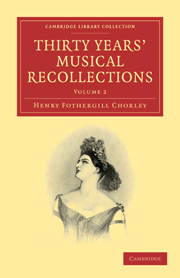Book contents
- Frontmatter
- Contents
- THE YEAR 1847
- THE YEAR 1848 (Her Majesty's Theatre.)
- THE YEAR 1848 (Royal Italian Opera.)
- THE YEAR 1849 (Her Majesty's Theatre.)
- THE YEAR 1849 (Royal Italian Opera.)
- THE YEAR 1850 (Her Majesty's Theatre.)
- THE YEAR 1850 (Royal Italian Opera.)
- THE YEAR 1851 (Her Majesty's Theatre.)
- THE YEAR 1851 (Royal Italian Opera.)
- THE YEAR 1852 (Her Majesty's Theatre.)
- THE YEAR 1852 (Royal Italian Opera.)
- THE YEAR 1853 (Royal Italian Opera.)
- THE YEAR 1854 (Royal Italian Opera)
- THE YEAR 1855 (Royal Italian Opera.)
- THE YEAR 1856 (Her Majesty's Theatre.)
- THE YEAR 1856 (Royal Italian Opera.)
- THE YEAR 1857 (Royal Italian Opera.)
- THE YEAR 1857 (Her Majesty's Theatre.)
- THE YEAR 1858 (Her Majesty's Theatre.—Royal Italian Opera.—Drury Lane.)
- THE YEAR 1859 (Royal Italian Opera.—Drury Lane.)
- The Last Chapter
THE YEAR 1847
Published online by Cambridge University Press: 29 August 2010
- Frontmatter
- Contents
- THE YEAR 1847
- THE YEAR 1848 (Her Majesty's Theatre.)
- THE YEAR 1848 (Royal Italian Opera.)
- THE YEAR 1849 (Her Majesty's Theatre.)
- THE YEAR 1849 (Royal Italian Opera.)
- THE YEAR 1850 (Her Majesty's Theatre.)
- THE YEAR 1850 (Royal Italian Opera.)
- THE YEAR 1851 (Her Majesty's Theatre.)
- THE YEAR 1851 (Royal Italian Opera.)
- THE YEAR 1852 (Her Majesty's Theatre.)
- THE YEAR 1852 (Royal Italian Opera.)
- THE YEAR 1853 (Royal Italian Opera.)
- THE YEAR 1854 (Royal Italian Opera)
- THE YEAR 1855 (Royal Italian Opera.)
- THE YEAR 1856 (Her Majesty's Theatre.)
- THE YEAR 1856 (Royal Italian Opera.)
- THE YEAR 1857 (Royal Italian Opera.)
- THE YEAR 1857 (Her Majesty's Theatre.)
- THE YEAR 1858 (Her Majesty's Theatre.—Royal Italian Opera.—Drury Lane.)
- THE YEAR 1859 (Royal Italian Opera.—Drury Lane.)
- The Last Chapter
Summary
It has already been told that, earlier than 1846, dissatisfaction in the Opera-performances at Her Majesty's Theatre,—so loudly recommended in print, so systematically weakened and impaired, was beginning to be general.—Ears are stubborn facts.—The increasing inferiority of the company, as a whole, was not to be concealed by the unanimous praises of which it was the object.—It has been told that the theatre was always crowded—that the audience was always rapturous. The time had been a golden time for those who made bouquets—since the rain of them was abundant and increasing. But spectators who cared the least for tales behind the curtain, of managerial disloyalty or artistic exaction—and who were the most willing to repose an average faith on all the papers put forth—remembered the good days that had been; and felt that however loud might be the trumpeting, however brilliantly put forth the procession of actors and singers—all vaunted as better than the best who had gone before them—the Opera was virtually in a state of downfall and deterioration.—The departure of one long before known as among the best musical conductors in Europe—and with it the dilution of orchestra and chorus—passed over, seemingly without any change in public favour.—Nothing, apparently, could be more prosperous, more popular, or beyond the power of revolt or opposition to interfere with.
- Type
- Chapter
- Information
- Thirty Years' Musical Recollections , pp. 1 - 21Publisher: Cambridge University PressPrint publication year: 2009First published in: 1862

